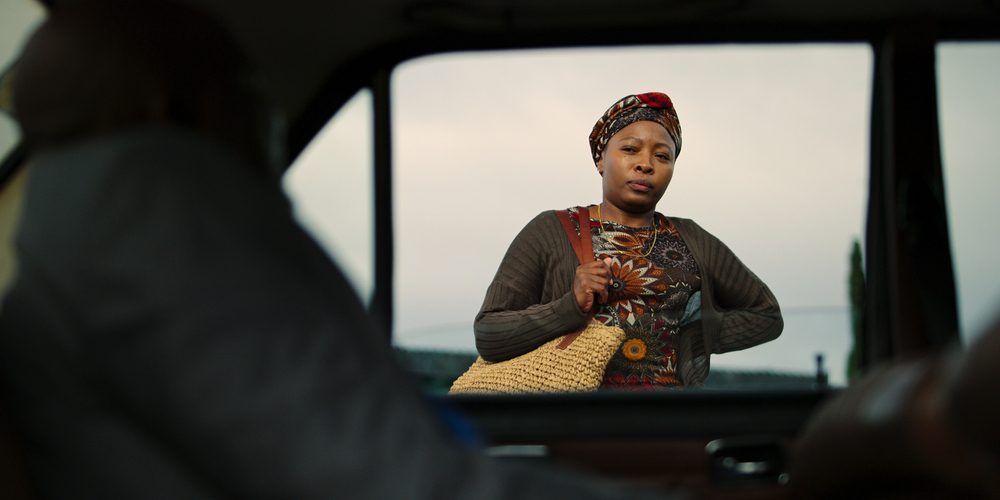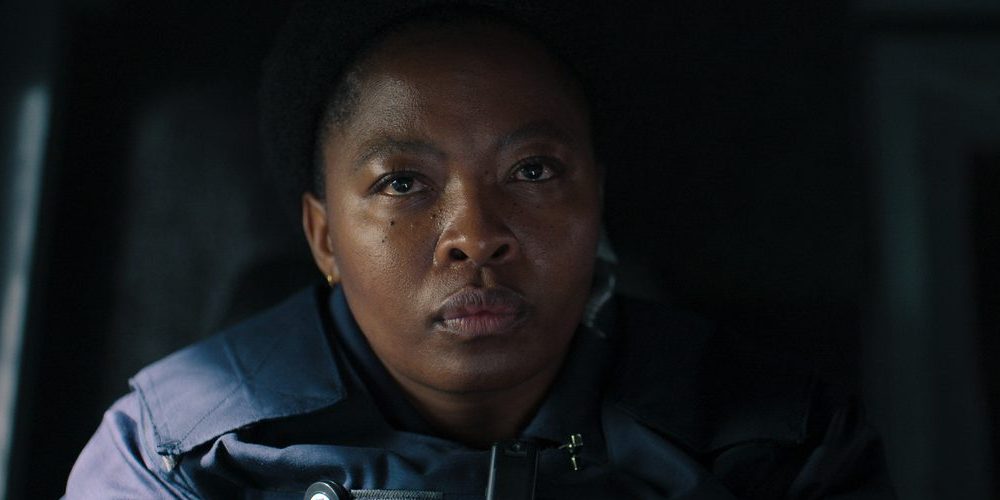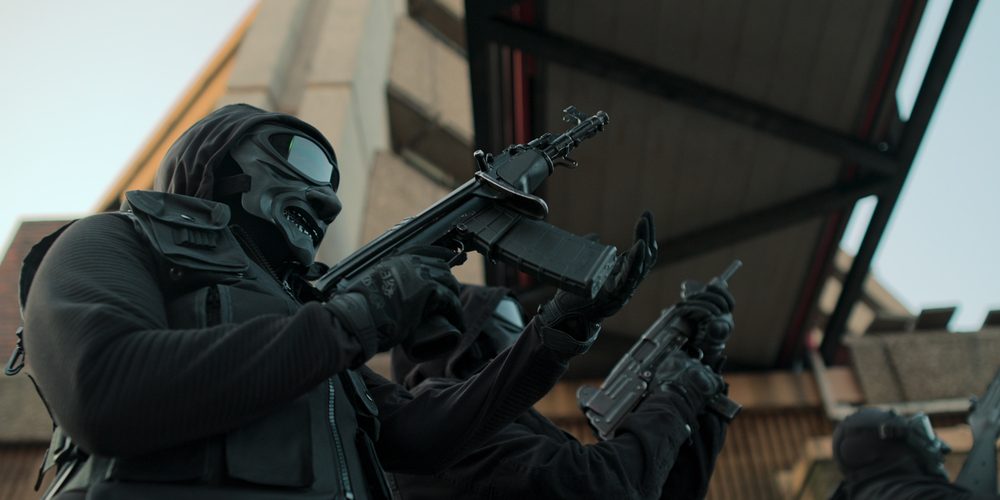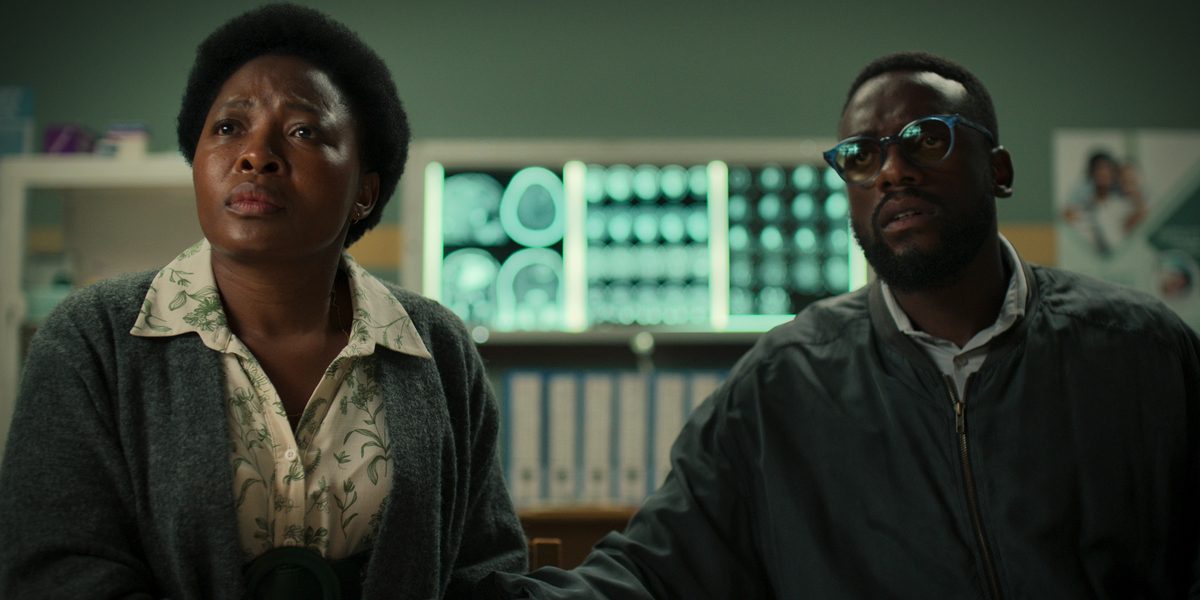Netflix series ‘Marked’ is a crime thriller that chronicles the journey of a female guard trying to do anything and everything to save her daughter from cancer. It follows Babalwa (Lerato Mvelase), a former police officer who is now working as a cash-in-transit guard for Iron Watch. She is working hard for her daughter, Palesa, who is suffering from cancer and needs treatment. When all her close ones refuse to help her financially, Babalwa is forced to take extreme steps and devise a plan that will not only resolve all her problems but also put her life in danger. As the story continues, the guard makes an unusual alliance with a small-time criminal, Zweli, to complete a heist at Iron Watch, the company where Babalwa works.
Things begin to change quickly for the former police officer as she finds herself in a world that she thought she’d never be a part of. However, Babalwa is willing to do anything for her daughter and stitches a plan to allow her to give her daughter a second chance. With the former police officer mapping out every detail with precision, she assembles a crew that would help her achieve success. Apart from focusing on the crime, the series doesn’t shy away from exploring themes like corruption, betrayal, and how the system can push a person to the edge. By showcasing these aspects, ‘Marked’ becomes more than just a story; it becomes a commentary on the quiet desperation that drives ordinary people to extraordinary extremes, adding much-needed emotional depth to the narrative.
Marked Tells a Brutal Fictional Tale Inspired by Real-Life Issues
‘Marked’ is driven by a fictional story about a woman trying to rob a facility to get money for her daughter’s treatment. Although the makers conceived the story, the project takes a lot of inspiration from real-life issues faced by ordinary people. Babalwas is an honest worker and lives with morals, but her seniors throw her out of the police force because she exposes the corruption taking place in her department. The thought of their corruption coming out scared everyone, and when she testified against some of her colleagues, the department decided to punish her. This incident turned out to be a big lesson for her. However, she didn’t let go of her morality and lived a life with no regrets.

When she thought things couldn’t go any worse, her daughter, Palesa, was diagnosed with cancer and they need almost R1.2 million for the surgery. Just like anyone would do in real life, she reaches out to the people who could help her, including the church, so that she could get some assistance. When people don’t help her, Babalwa realizes that she needs to let go of her virtue and think about how she can help her family, which takes her on a route that is the opposite of everything she stands for. This perspective grounds the production in a stark, relatable truth. When a person deals with a world that has been cruel to them, desperation sets in, and even the most principled people can be pushed to the edge.
Moreover, it reflects a harsh reality faced by many: that survival sometimes demands sacrifice, and people need to make impossible choices. Losing your morality is difficult and prompts viewers to empathize with the characters. That’s what Akin Omotoso, creator of the show, wants to focus on while peeling back the layers of crime and drama to reveal the societal and emotional weight behind every decision characters make. He told Netflix, “What we have really captured in this series is empathy with the characters, so you feel what they are going through.”
The Series Explores a World Led by a Strong Woman
While ‘Marked’ is largely about the heist, it also explores how a strong woman like Babalwa is taking the lead and jumping into a world that is not only dangerous but also unforgiving. The character not only leads from the front when it comes to the heist, but she also leads the household because she is the only breadwinner. Her husband, Lungile, is trying to be ordained as a pastor and is busy with his church work. As a result, all the onus of getting the money is on Babalwa. This particular theme mirrors the real-life struggles of countless women who silently carry the weight of both their homes and their families’ futures. She takes pride in what she is doing for her family and leading from the front, which is a reality because women are increasingly taking the lead and doing equally well as their counterparts.

Consequently, the project captures that emotional labor where strength isn’t a choice, but a necessity in a world that offers little support and even fewer second chances. To portray a character like Babalwa, actor Lerato Mvelase had to imagine herself as a mother, which helped her feel that portraying this fierce lady was more than just an acting job. She told What’s On Netflix, “I had to imagine myself, Lerato Mvelase, in this desperate and life-threatening situation with my kids. Adding this element allowed me to give Babalwa a real sense of existence.” In South Africa, women lead households in large numbers, and the numbers are only increasing. According to a report, in 2024, 42.4% of households in South Africa were led by women.
Although the pay disparity between male and female workers remains a problem, more and more women are stepping into leadership roles at home and in the workplace. That’s why the makers chose a woman to lead the heist genre, an aspect that has not been seen very often in crime dramas. By placing a female character at the center of the heist, the show not only subverts genre expectations but also celebrates the power and complexity of leadership under pressure. For director Matshepo Maja, showcasing the story through a female perspective gives viewers a more layered view of the stakes involved. She told the streaming platform, “The fact that it is a female character (Babalwa) in an often male-dominated genre. I think a lot of people are gonna be excited to see that different perspective.”
Marked Blends Mystery with the Themes of Organized Crime and Corruption
Throughout the history of cinema and the world of Television, there have been several movies about organized crime. Joining the bandwagon is ‘Marked,’ which tells the story of a group trying to rob Iron Watch and gives a glimpse of how organized crime is such a significant issue in South Africa. In the initial part of the story, Babalwa meets a man named Baba G, who is considered to be the heist kingpin of Soweto. He wants Babalwa to help him complete a heist, and if she does that, she will get the money for her daughter’s surgery. Although she says no to him, the former police officer realizes that she needs to help him if she wants to save her daughter. Baba G is a wealthy man who has his gang and has been part of the crime syndicate for years now.

South Africa has been facing the issue of organized crime for several decades now. It encompasses various forms of unlawful activities such as drug trafficking, armed robberies, illegal mining, wildlife trafficking, and more. According to the Global Organized Crime Index report in 2023, South Africa is ranked 7th when it comes to the highest criminality rate in the world, with financial crimes being one of the most significant contributors to the ranking. Moreover, it faces the problem of having crime syndicates that engage in several criminal activities, including robberies. For instance, in April 2014, an armed gang drugged security guards at the SBV cash centre in Witbank and stole R87 million from the vault. Police arrested 17 people for the crime, which included former SBV employees.
However, the root cause of such criminal activities is corruption. Corruption erodes trust in institutions and weakens law enforcement, creating loopholes that crime syndicates easily exploit. Corruption is the reason why Babalwa, in the show, loses her job in the police department. Everything was going smoothly, but when she exposed corruption, it backfired, and she had to work as a security guard. But when things got rough again, she became a part of the organized crime syndicate and committed an armed robbery. This is another aspect that makes ‘Marked’ so uncomfortably real, showing how corruption has a direct link with organized crime. Moreover, it reflects a system where survival often means becoming part of what you once fought against.
Read More: Marked Ending Explained: Did Babalwa Save Her Daughter?


